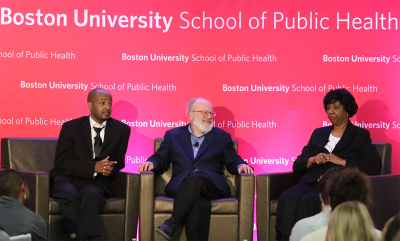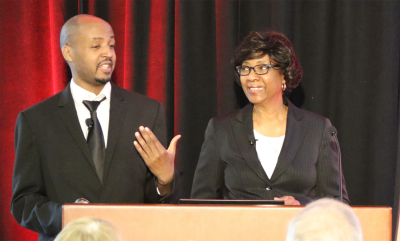‘So Many People Are Touched by the Story, You Just Want to Tell It’.
 Henrietta Lacks was a poor black woman who died in 1951 from cervical cancer. Her cells, taken in several samples from her tumor, were used in research without her knowledge or consent to create the first “immortal” cell line. Known as HeLa, that cell line led to major medical advances including the development of the polio vaccine, and have survived into the present as part of a multimillion dollar industry of which her family was unaware for decades, and from which they never received compensation.
Henrietta Lacks was a poor black woman who died in 1951 from cervical cancer. Her cells, taken in several samples from her tumor, were used in research without her knowledge or consent to create the first “immortal” cell line. Known as HeLa, that cell line led to major medical advances including the development of the polio vaccine, and have survived into the present as part of a multimillion dollar industry of which her family was unaware for decades, and from which they never received compensation.
![]() On February 21, David Lacks Jr., Henrietta’s grandson, and her daughter-in-law, Shirley Lacks, visited SPH as part of the 2016-2017 Diversity and Inclusion Seminar Series. The Immortal Life of Henrietta Lacks by Rebecca Skloot had been selected as this year’s SPH Reads book, to be read and discussed by students, faculty, and staff, and the conversation continued with this standing-room-only event. The seminar was moderated by George Annas, William Fairfield Warren Distinguished Professor of health law, policy & management.
On February 21, David Lacks Jr., Henrietta’s grandson, and her daughter-in-law, Shirley Lacks, visited SPH as part of the 2016-2017 Diversity and Inclusion Seminar Series. The Immortal Life of Henrietta Lacks by Rebecca Skloot had been selected as this year’s SPH Reads book, to be read and discussed by students, faculty, and staff, and the conversation continued with this standing-room-only event. The seminar was moderated by George Annas, William Fairfield Warren Distinguished Professor of health law, policy & management.
Lacks’ daughter, Deborah, traveled the country with Skloot to learn more about her mother and the HeLa cell line. She died in 2009, a year before Skloot’s book was published. Shirley Lacks, Henrietta’s daughter-in-law, continues Deborah’s work to share the family’s legacy. David Lacks Jr., Henrietta’s grandson, now represents the family on the National Institute of Health panel that reviews applications to conduct research using HeLa cells. “Instead of being the last people to know for the last 61 years, we are going to be the first to know,” he said during the seminar.
Shirley and David Lacks sat down before the event to talk about Henrietta’s legacy and why her story needs to be told.
How did your family learn this story?
David Lacks: It took 25 years before the family would learn about Henrietta Lacks’ cells, and another several decades later my aunt went on a journey with Rebecca Skloot to learn about these cells and her mother. She never really knew her mother, so she wanted to find out everything she could.
Shirley Lacks: Deborah met Rebecca Skloot through Dr. Roland Pattillo at the Morehouse School of Medicine, and once they got that bond going, Deborah found out all the information she wanted to know about her mother, and all the contributions her mother had made to the world through HeLa.
Before Deborah passed away it brought closure, the fact that she had found out what she wanted to know about her mom, and the rest of the family went on from there to try to keep the legacy of Henrietta alive.
 What roles do you play in this legacy, in telling this story?
What roles do you play in this legacy, in telling this story?
SL: When Deborah was alive and and Rebecca was writing the book, Deborah said to me, ‘Shirley, if anything ever happens to me I want you to make sure that this continues.’ I said, ‘OK, Deborah,’ not expecting anything to happen to her. When she passed away, my daughter and her dad cemented the relationship with Rebecca, and we began communicating, and we began speaking engagements—I didn’t want to, but Deborah said if anything happens to her to make sure this continues to go on, and I wanted to honor her request.
DL: My role would be as an educator, trying to get young people into medicine and research. I tell people that before the book I was strictly an IT person, and this book opened doors that I gladly walked through. Our family took the time to walk through these doors and educate ourselves, and now we take the role of educating people about Henrietta Lacks, the HeLa cells, and the medical community in general.
What do you see as the importance of telling this story?
SL: Henrietta was a young woman, uneducated, African American, and she made such a major contribution to science and medicine. We don’t want it to be forgotten.
DL: It’s black history, it’s women’s history, it’s world history. You have to tell the story. And you have to encourage people to pay attention to the medical world because it’s important to everybody, everybody is going to be affected by a disease, it touches us all. I think it’s important to be encouraged and get involved. A lot of people have told me they read this book and they got into medicine or research, and that’s a powerful thing in itself, to inspire people. So many people are touched by the story that you just want to tell it.
For the family, the book touched on so many issues that we’ve become advocates, and we’re branching out to address some of these issues in medicine, issues of disparity. The book touches on many, many issues, and it’s our call to keep Henrietta’s legacy alive and to work on some of these issues to improve the lives of people around the world.